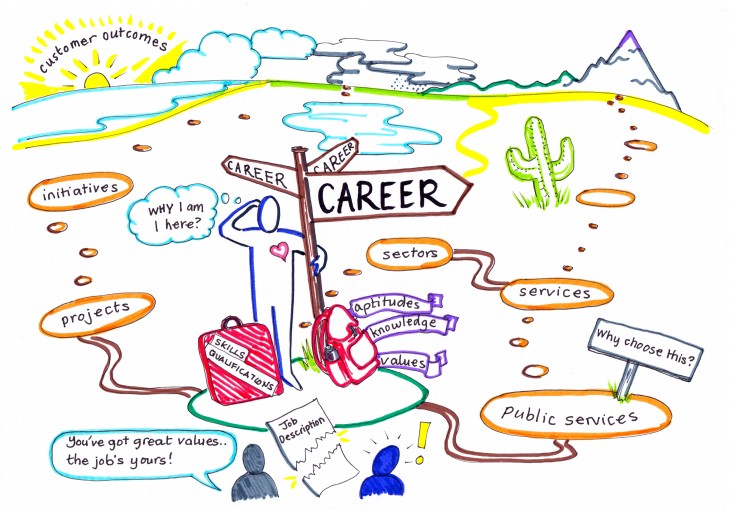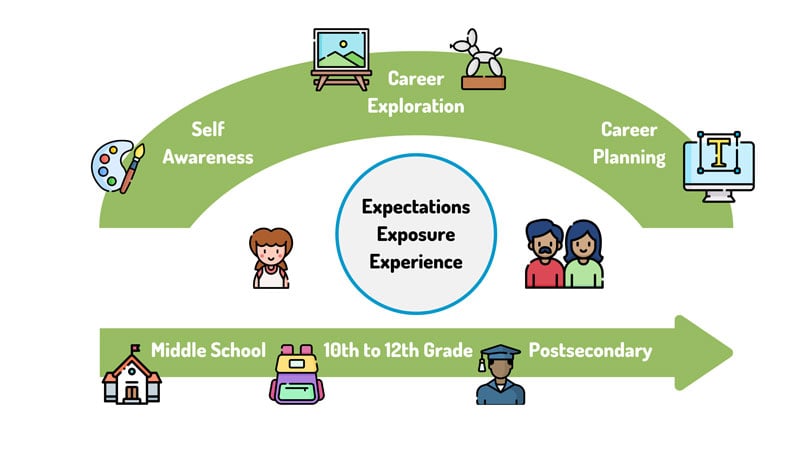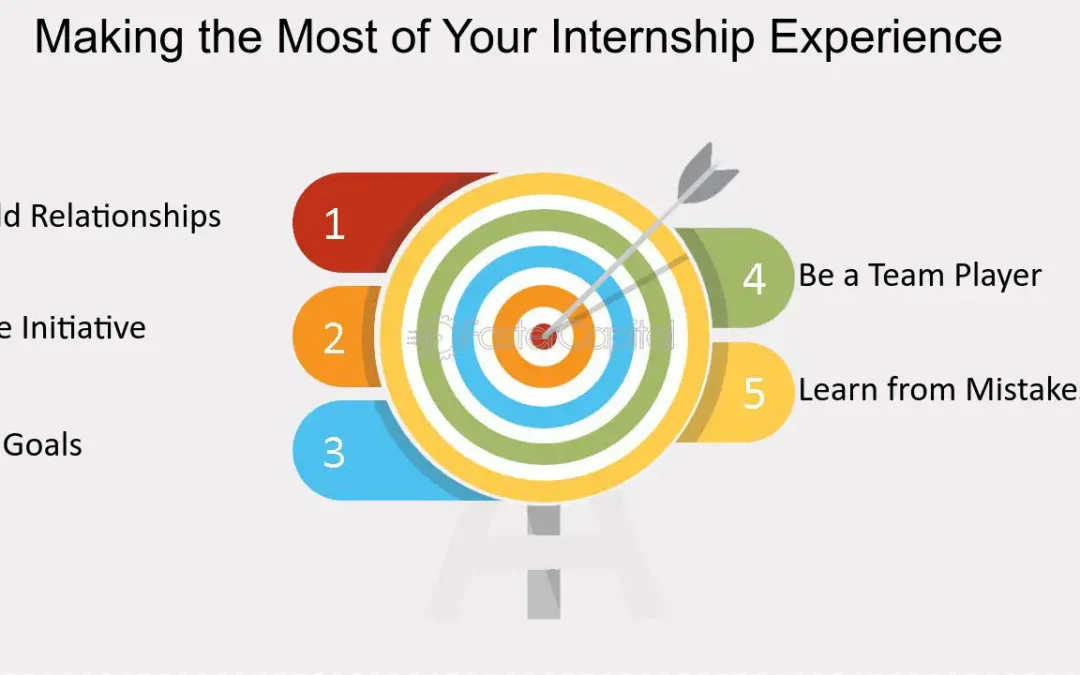
by admin | Jun 5, 2024 | Job Analysis, Skills Gap Analysis, Study
A well-defined career path is crucial for several reasons, each contributing to both personal fulfillment and professional success. Here’s why setting and following a career path is so important:

1.Direction and Clarity: Having a clear career path provides a sense of direction. It helps individuals focus their efforts on specific goals and milestones, reducing the likelihood of wandering aimlessly through different jobs. This clarity can be incredibly motivating and can help one prioritize learning and development activities that align directly with their career goals.
2. Goal Achievement: A career path helps break down the journey into manageable steps and stages. It allows individuals to set and achieve short-term objectives while working towards long-term aspirations. This structured approach to career development ensures continuous progress and can lead to higher satisfaction and success rates.
3. Skill Development: By understanding the requirements of your chosen career path, you can identify the skills and competencies you need to develop. This proactive approach to skill acquisition ensures that you remain competitive and relevant in your field, especially as job markets evolve and new technologies emerge.
4. Job Satisfaction and Engagement: People who work in careers that align with their personal interests and professional skills tend to be more engaged and satisfied. A career path that reflects one’s values and strengths can lead to greater job satisfaction, lower stress levels, and a higher quality of life.
5. Professional Growth : A career path provides a roadmap for advancement. It often includes planned upward movement, whether through promotions within a chosen field or strategic moves across different industries. This growth is not just about higher income but also about expanding responsibilities, gaining diverse experiences, and enhancing one’s reputation and influence in the industry.
6. Adaptability: With a career path, individuals can better anticipate changes in their industry and adapt accordingly. It encourages a mindset of lifelong learning and flexibility, which are crucial in today’s fast-paced work environments. Being adaptable helps ensure that you can navigate through economic downturns, industry disruptions, and job transitions more effectively.
7. Personal Fulfillment : Ultimately, a career path that aligns with one’s passions and strengths can lead to personal fulfillment. Achieving milestones and realizing one’s professional potential can be profoundly satisfying, contributing to overall happiness and well-being.
In essence, a career path helps individuals systematically approach their professional life, ensuring that they make informed decisions that lead to personal and professional fulfillment. It acts as a strategic plan that guides individuals through the complexities of the modern workplace, helping them to capitalize on opportunities and overcome challenges effectively.

by admin | Jun 5, 2024 | Study, Skills Gap Analysis
Creating a study schedule is a crucial strategy for college students to manage their time effectively, balance various commitments, and enhance academic performance. Here’s a step-by-step guide to help students create a practical and personalized study schedule:

1: List All Commitments
Start by listing all your commitments that are fixed in time, such as classes, part-time jobs, meals, and regular extracurricular activities. This will provide a clear view of how much time is already taken and how much is potentially available for studying.
Step 2: Assess All Subjects
Evaluate all the subjects you need to study for and rank them based on their difficulty, the amount of time they require, and upcoming deadlines or exams. This helps in prioritizing which subjects need more focus.
Step 3: Set Specific Goals
For each study session, set specific goals. Instead of a vague goal like “study biology,” define what you intend to accomplish, e.g., “review chapter 5 on cell biology and complete 20 practice questions.”
Step 4: Allocate Time Blocks
Using a weekly planner, allocate specific time blocks for studying each subject. Consider your personal productivity patterns—some people are morning persons, while others function better at night. Ensure that time blocks are realistic and include short breaks to prevent burnout.
Step 5: Be Flexible
Life is unpredictable. Your schedule should have some flexibility to adjust for unexpected events or tasks that take longer than planned. Ensure some buffer time each week for overflow tasks and relaxation.
Step 6: Include Breaks and Downtime
Include short breaks during study sessions (e.g., 5-10 minutes every hour) and longer breaks to relax or pursue hobbies. This not only prevents burnout but also improves concentration and retention of information.
Step 7: Review and Adjust Weekly
At the end of each week, review your schedule. Assess what worked well and what didn’t. Did you meet your study goals? Adjust your plan based on what you’ve learned about your productivity and the workload.
Step 8: Use Tools and Apps
Consider using digital tools or apps to manage your time. Apps like Google Calendar, Trello, or study-specific apps like My Study Life can help you organize your schedule and send reminders for your planned study sessions.
Step 9: Stay Consistent
The effectiveness of a study schedule lies in its consistent application. Try to start study sessions at the same time each day to develop a routine. Consistency builds habits, which can enhance overall productivity.
Step 10: Stay Motivated
Keep your motivation high by setting small rewards for achieving your study goals, such as treating yourself to a favorite snack or an episode of a TV show. Remember to keep sight of your long-term academic goals and how your daily studying gets you closer to achieving them.
By following these steps, students can create a tailored study schedule that not only accommodates their academic needs but also balances personal well-being and other responsibilities. A well-structured study plan is a powerful tool in achieving academic success and reducing stress.

by admin | May 29, 2024 | Employee Orientation, Employee Handbooks, Job, Job Analysis, Skills Gap Analysis, Study
Finding and landing an internship as a college student is an important step in building a career foundation. Here’s a guide on how to search for and secure internships effectively:

Step 1: Define Your Goals
Start by understanding what you want to achieve through an internship. Are you looking to gain specific skills, explore a particular industry, or connect with a professional network? Clear objectives will help guide your search and decision-making process.
Step 2: Research Opportunities
– Online Job Boards: Websites like Indeed, LinkedIn, Glassdoor, and specialized sites such as Internships.com are great resources.
– University Career Center: Many colleges offer resources and counseling specifically for students seeking internships. They often have connections with companies looking for interns.
– Company Websites: If you have target companies in mind, visit their careers section. Many companies post internship opportunities directly on their websites.
– Networking: Attend career fairs, industry conferences, and networking events. Sometimes, opportunities come from personal connections, including professors, family, or friends.
Step 3: Prepare Your Application Materials
– Resume: Tailor your resume to highlight relevant coursework, projects, and skills that align with the internship. Keep it concise and professional.
– Cover Letter: Write a personalized cover letter for each application, explaining why you are interested in the internship and how you can contribute.
– Portfolio: For fields like graphic design, journalism, or software engineering, prepare a portfolio of your best work.
Step 4: Apply Early and Often
Internship positions, especially in competitive fields, can fill quickly. Start your search early in the academic year and apply to multiple opportunities to increase your chances.
Step 5: Prepare for Interviews
– Research the Company: Understand their products, services, culture, and industry.
– Practice Common Interview Questions: Prepare responses to common questions such as “What are your strengths and weaknesses?” or “Why do you want this internship?”
– Mock Interviews: Consider doing mock interviews with friends, family, or career counselors to build confidence.
Step 6: Follow Up
After an interview, send a thank-you email to express your appreciation for the opportunity to interview and reiterate your interest in the position. This can set you apart from other candidates.
Step 7: Evaluate Offers
If you receive multiple internship offers, compare them based on how well they meet your initial goals, the kind of learning opportunities they provide, and other factors like compensation and location.
Step 8: Learn and Network During Your Internship
Once you secure an internship, maximize the experience:
-Learn as Much as Possible: Take the opportunity to learn from everyone you can. Ask questions, seek feedback, and take on challenging projects.
– Build Relationships: Network with colleagues and other interns. These relationships can be valuable for your future career.
– *Maintain Professionalism: Treat the internship like a real job. Be punctual, meet deadlines, and contribute positively to the team.
Step 9: Reflect and Follow Up
After completing your internship, reflect on what you learned and how it aligns with your career goals. Stay in touch with your supervisors and coworkers, as they can be valuable references or mentors.
By following these steps, you can effectively search for, apply to, and maximize the benefits of internships, paving the way for future career opportunities.

by admin | May 29, 2024 | Job Analysis, Employee Handbooks, Employee Orientation, Employment Application, Job, Skills Gap Analysis, Study
An internship is a valuable opportunity to gain practical experience, build professional skills, and establish a network in your desired industry. Here’s a comprehensive guide on how to make the most of your internship experience:

1. Set Clear Goals
Before starting your internship, define what you hope to achieve. Are you looking to develop specific skills, gain insights into a particular industry, or make professional connections? Setting clear, measurable goals will help you stay focused and evaluate your progress.
2. Understand Your Role and Responsibilities
– Learn the Basics: Understand the fundamental tasks and expectations of your role. Don’t hesitate to ask for a detailed description of your responsibilities.
– Ask Questions: In the beginning, you might feel overwhelmed. Ask questions to clarify tasks and expectations to ensure you’re on the right track.
3. Be Proactive
– Take Initiative: Look for opportunities to contribute beyond your assigned tasks. This could involve suggesting new ideas or helping a project in need.
– Seek Additional Projects: As you grow more comfortable in your role, ask for more responsibilities that align with your career interests and goals.
4. Build Your Network
– Connect Internally: Introduce yourself to as many coworkers as possible, not just those in your immediate team. Attend company events and social gatherings.
– Seek a Mentor: Identify someone within the organization from whom you can learn. This could be your supervisor or another experienced colleague.
– Maintain Contacts: Even after your internship ends, keep in touch with your colleagues and mentors. They can provide valuable advice and may inform you of future job opportunities.
5. Observe and Learn
– Industry Knowledge: Pay attention to how the company operates and how your department fits into the larger picture. Understand the industry trends and challenges.
– Professional Skills: Note the soft skills displayed by successful employees, such as communication, teamwork, and problem-solving.
6.Ask for Feedback
– Regular Feedback: Regularly ask for feedback on your performance. This not only shows your eagerness to improve but also helps you adjust your approach before small issues become larger.
– Performance Review: If your internship program includes a formal review, prepare by reviewing your accomplishments and areas for improvement.
7. Document Your Experience
– Keep a Journal: Regularly write down what you learn, the skills you develop, the projects you work on, and the people you meet.
– Portfolio: For creative fields, keep samples of your work to show future employers. For other fields, a detailed list of project roles and impacts can be useful.
8. Professional Conduct
– Punctuality : Always arrive on time or early, and respect deadlines.
– Dress Appropriately : Follow the company’s dress code, aiming for a professional appearance.
Ethics and Confidentiality: Be mindful of the company’s code of conduct, especially with confidential information.
9. Reflect on Your Experience
At the end of your internship, reflect on what you’ve learned and how it applies to your career goals. Evaluate the extent to which you’ve achieved your initial goals and what steps you should take next in your career path.
10. Exit Gracefully
– Thank You Notes : Send personalized thank-you notes to your supervisor and anyone else who was particularly helpful during your internship.
– Exit Interview : If an exit interview is offered, participate thoughtfully. Provide constructive feedback about the internship experience and express gratitude for the opportunity.
By actively engaging in these practices, you can maximize your internship experience, making it a pivotal step towards a successful career.

by admin | May 3, 2024 | Job Analysis, Employee Orientation, Employment Application, Skills Gap Analysis, Study
Transitioning from the world of academia to the workforce can be both exhilarating and daunting. As a student on the brink of entering the professional realm, you may have questions about what to expect and how to navigate this significant life transition. Fear not! Here’s a comprehensive guide to help you prepare for the journey ahead.

1. Adjusting Your Mindset
The shift from student to employee involves more than just a change in schedule—it requires a shift in mindset. Embrace the reality that you are now part of a team working towards common goals. Be prepared to take on responsibilities, make decisions, and contribute your skills and expertise to your new workplace.
2. Navigating Company Culture
Every workplace has its own unique culture and set of norms. Take the time to observe and understand the culture of your new workplace. Pay attention to how people communicate, dress, and interact with one another. Adapt your behavior accordingly while staying true to your values and principles.
3. Mastering Time Management
In the professional world, time is a precious commodity. Learn to prioritize tasks, set deadlines, and manage your time effectively. Utilize tools and techniques such as to-do lists, calendars, and time-blocking to stay organized and focused. Remember, punctuality is key—arrive on time for meetings and deadlines.
4. Developing Professional Relationships
Building strong relationships with your colleagues is essential for success in the workplace. Be approachable, friendly, and open to collaboration. Take the initiative to introduce yourself, ask questions, and seek feedback. Cultivate positive working relationships based on trust, respect, and mutual support.
5. Embracing Continuous Learning
Just because you’ve graduated doesn’t mean your learning journey is over. Embrace the mindset of lifelong learning and professional development. Seek out opportunities to expand your knowledge and skills through training programs, workshops, and certifications. Stay curious, adaptable, and open to new experiences.
6. Navigating Office Politics
Office politics can be tricky to navigate but ignoring them won’t make them disappear. Be aware of the dynamics at play in your workplace and tread carefully. Avoid gossip, cliques, and power struggles. Focus on your work, maintain professionalism, and build alliances based on merit and mutual respect.
7. Managing Expectations
As a new employee, you may feel pressure to prove yourself and excel in your role. While ambition is admirable, it’s important to manage your own expectations realistically. Give yourself time to adjust to your new environment, learn the ropes, and grow into your role. Rome wasn’t built in a day, and neither is a successful career.
8. Seeking Feedback and Growth Opportunities
Don’t be afraid to seek feedback from your managers, colleagues, and mentors. Use constructive criticism as an opportunity for growth and improvement. Take on new challenges, volunteer for projects outside your comfort zone, and actively seek opportunities for advancement within your organization.
9. Maintaining Work-Life Balance
Finally, remember to prioritize your well-being and maintain a healthy work-life balance. Set boundaries between work and personal life, and make time for activities that recharge your batteries and bring you joy. Remember, a happy and fulfilled employee is a productive employee.
In conclusion, transitioning from student to employee is a significant milestone in your life journey. By adjusting your mindset, navigating company culture, mastering time management, developing professional relationships, embracing continuous learning, navigating office politics, managing expectations, seeking feedback and growth opportunities, and maintaining work-life balance, you can successfully navigate this transition and thrive in your new role. So, embrace the journey with confidence, curiosity, and a willingness to learn and grow. Your future awaits!

by admin | Mar 18, 2024 | Job, Job Analysis, Skills Gap Analysis, Study
Title: Exploring Opportunities: Finding the Right Internship for You

Embarking on an internship journey is an exciting step towards shaping your career path and gaining invaluable real-world experience. However, with countless opportunities available, finding the right internship can feel like navigating a vast ocean. How do you identify the perfect fit amidst a sea of options? Let’s embark on a journey of exploration and discovery to help you find the internship that aligns with your goals, interests, and aspirations.
1. **Define Your Goals and Objectives:**
Before diving into the internship search process, take some time to reflect on your career goals and what you hope to achieve through an internship experience. Consider the skills you want to develop, industries you’re interested in exploring, and the type of work environment that suits you best. Clarifying your objectives will help you narrow down your search and focus on opportunities that align with your aspirations.
2. **Conduct Research:**
Once you have a clear idea of what you’re looking for, it’s time to start researching potential internship opportunities. Explore various companies, organizations, and industries that align with your interests and goals. Utilize online job boards, company websites, professional networks, and career fairs to gather information about internship programs available in your field of interest.
3. **Network and Seek Recommendations:**
Networking is a powerful tool for uncovering hidden internship opportunities and gaining insider insights. Reach out to professionals in your desired industry through networking events, informational interviews, and online platforms like LinkedIn. Don’t hesitate to ask for recommendations or referrals from professors, mentors, or peers who may have connections in your field of interest.
4. **Utilize Career Services:**
Many universities and colleges offer career services and internship placement assistance to students. Take advantage of these resources to access job listings, resume reviews, interview preparation workshops, and career counseling sessions. Career advisors can provide valuable guidance and support throughout the internship search process.
5. **Tailor Your Application Materials:**
Once you’ve identified internship opportunities that interest you, tailor your resume, cover letter, and any other application materials to highlight relevant skills, experiences, and qualifications. Customize each application to align with the specific requirements and preferences of the internship program or organization.
6. **Prepare for Interviews:**
As you start receiving interview invitations, it’s essential to prepare thoroughly to make a positive impression. Research the company, practice common interview questions, and be ready to articulate your interest in the internship and how you can contribute to the organization’s success. Additionally, prepare questions to ask the interviewer to demonstrate your enthusiasm and curiosity.
7. **Evaluate Offers Carefully:**
Congratulations! You’ve received one or more internship offers. Take the time to carefully evaluate each offer based on factors such as the job responsibilities, learning opportunities, company culture, location, and compensation. Consider how each opportunity aligns with your goals and priorities before making a decision.
8. **Stay Flexible and Open-Minded:**
Keep in mind that the internship search process may involve some twists and turns, and you may encounter unexpected opportunities along the way. Stay flexible and open-minded as you explore different options and be willing to adapt your plans based on new information and experiences.
Finding the right internship is a journey of self-discovery and exploration. By defining your goals, conducting thorough research, leveraging your network, and staying proactive, you can uncover exciting internship opportunities that propel you closer to your career aspirations. Remember to approach the process with enthusiasm, curiosity, and a willingness to learn and grow. Your perfect internship awaits – go forth and explore!











